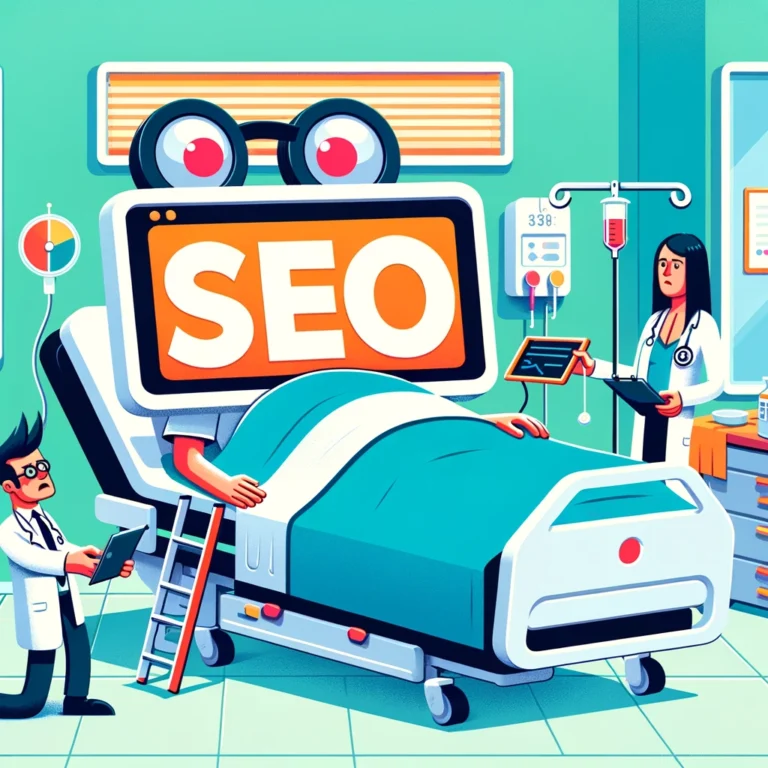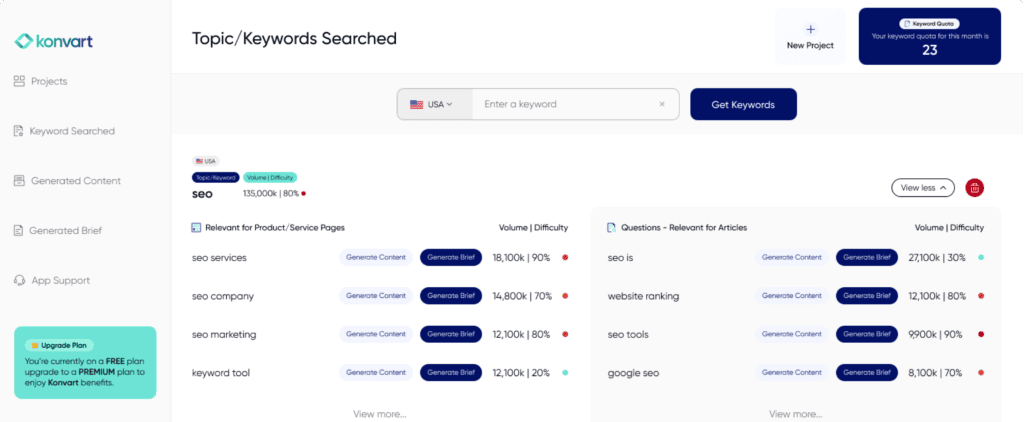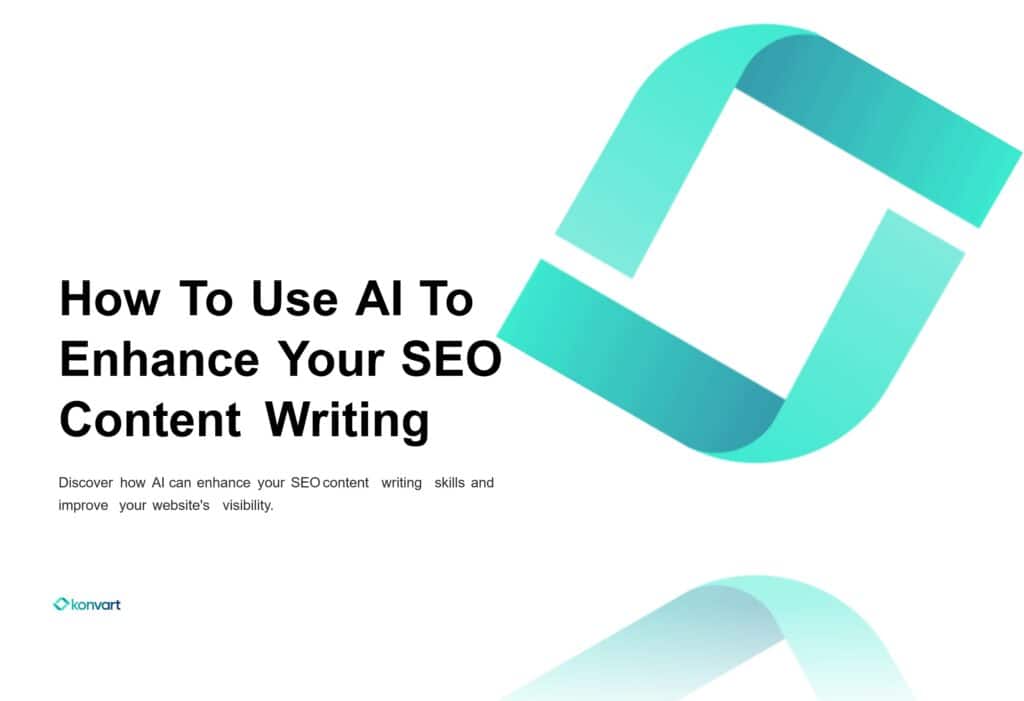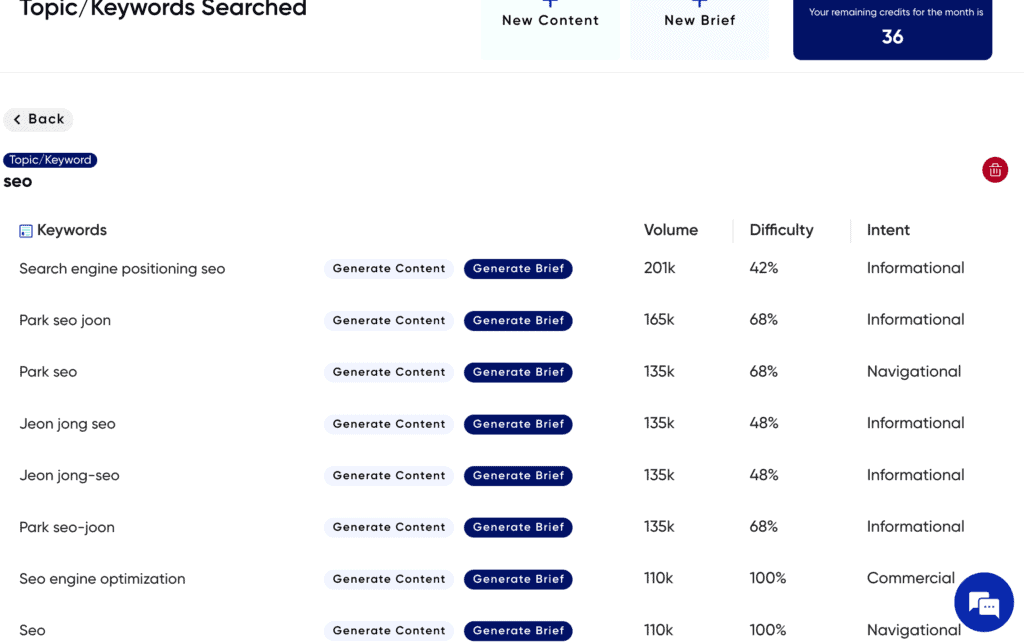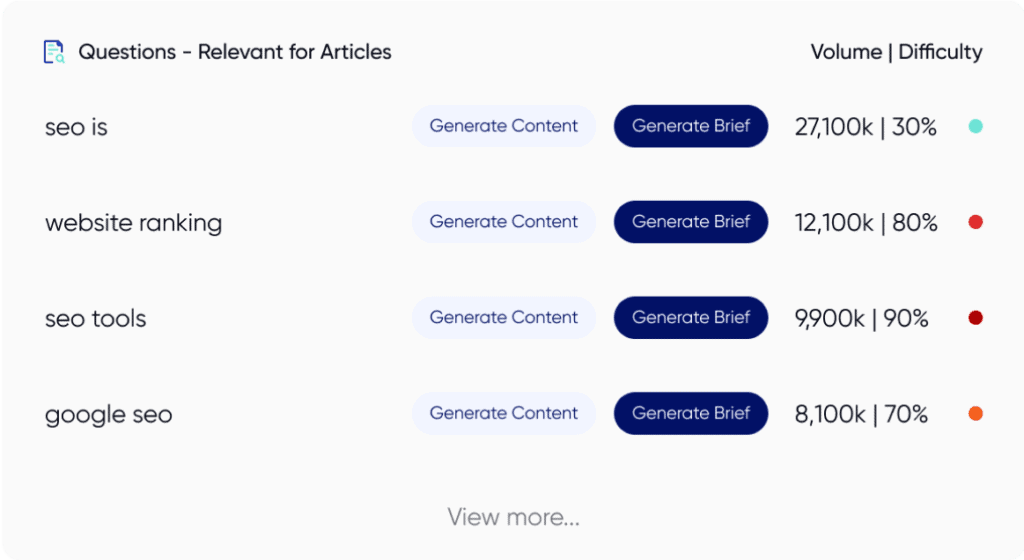Is SEO dead?
The short answer is no. SEO is not dead. However, search engines such as Google have seen a decrease in certain searches from some industries.
Digital marketers frequently debate whether SEO is still relevant now that AI is famous for solving problems and providing information.
Despite the evolving algorithms and new technologies that redefine how we approach content on the web, SEO remains a fundamental aspect of digital marketing strategy.
Earlier, we investigated how many people use Google vs Bing. In the course of that research, we found that about 4.5 billion people use search engines around the world.
Four billion people use Google, most of whom use Google search three to four times daily. In contrast, ChatGPT, the leader in the AI market, has about 180 million users. However, only some people use ChatGPT for search purposes; some use it to write novels, create images, write code, etc.
Informational searches on Google might contract with time as AI becomes more intelligent. Nevertheless, search engines will still be crucial when finding commercial and transactional information.
Furthermore, experts project the SEO industry will grow at approximately 17.6% compound annual growth rate (CAGR) and reach $234.8 billion by 2030.
It’s clear that SEO is very much alive and continues to be integral for businesses aiming to enhance their online visibility.
This article explores the current state of SEO, debunking myths and reinforcing why mastering it is as important as ever.
Why Do Some Digital Marketers Say SEO Is Dead?
Some digital marketers claim that SEO is dead because they believe the traditional methods no longer yield the same results. This means that tactics that were highly effective a few years ago might not work today.
For instance, keyword stuffing and excessive backlinking, once popular SEO strategies, are now penalised by Google’s algorithms, leading some to argue that SEO has lost its relevance.
Another reason for this belief is the rise of other digital marketing strategies, such as social media marketing and influencer partnerships, which can offer immediate results and high levels of engagement. Compared to SEO, which often requires long-term investment and patience for significant ROI, these newer methods can appear more attractive and effective, causing some marketers to shift their focus entirely.
Additionally, search engines’ increasing sophistication in understanding user intent has changed the game. Search engines like Google now prioritise user experience and domain/brand authority over technical optimisation strategies. They use artificial intelligence to interpret the context and need behind a search query rather than simply matching keywords.
There’s also the factor that big brands with years in the market already have that brand recognition and authority, and Google—largely because it doesn’t truly understand what is or is not quality content—rewards those brands so that anything they publish tends to rank well. This has led some to believe that traditional SEO techniques are obsolete.
Another reason for the repeated announcements of SEO’s death is the misinterpretation of how it is changing. As search engines become more advanced, they demand more sophisticated and nuanced SEO strategies, such as quality content creation and genuine user engagement tactics.
However, some marketers might not fully grasp these changes or how to adapt, leading them to conclude that SEO is no longer viable.
Despite these challenges and perceptions, data shows that SEO remains critical to effective digital marketing strategies.
According to a recent study by Highervisibility, organic search drives 1000% more traffic than organic social.
Also, based on our research, in certain industries, including legal and business services, organic search drives about 600% more web traffic than paid search and organic social.
The foregoing statistics simply emphasise that, even though optimisation strategies change, SEO at its core remains very strong in driving traffic and improving online visibility. With these insights, it’s clear that declaring SEO as “dead” is more about a lack of adaptation to its evolution than an actual decline in its effectiveness.
Successful digital marketers recognise that adapting their strategies to align with the current best practices is key to leveraging SEO’s full potential in enhancing online presence and reaching target audiences effectively.
Out-of-Date SEO Strategies
Keyword Stuffing
Once a common practice to boost page rankings, keyword stuffing is now considered an outdated SEO strategy. This technique involves loading a webpage with excessive keywords to manipulate a site’s ranking in Google search results.
Not only does this approach make content difficult to read, but it also harms the user experience.
Search engines have evolved with more sophisticated algorithms that penalise this practice, favouring content that provides genuine value to readers instead.
According to Google’s guidelines, filling pages with keywords results in a negative impact on site rankings.
Quantity Over Quality for Backlinks
In the early days of SEO, acquiring as many backlinks as possible was the key to ranking success.
However, the focus on quantity over quality has shifted significantly. Modern search engines now prioritise the relevance and quality of backlinks rather than sheer volume.
Practices like obtaining links from PBNs or participating in link exchange schemes can now lead to severe penalties from search engines like Google. Effective SEO today focuses on earning high-quality backlinks naturally through creating compelling content that others want to reference and share.
Ignoring User Experience
Historically, many SEO strategies concentrated solely on appealing to search engine algorithms, often at the expense of user experience (UX).
This outdated approach includes tactics like creating multiple pages for slight variations of keyword phrases or using aggressive pop-ups and intrusive ads.
Current search engine algorithms have become adept at evaluating UX signals such as mobile-friendliness, page load speed, and interactive elements.
Websites that provide a positive user experience are more likely to receive favourable rankings in search results, highlighting the importance of integrating UX into SEO practices.
These outdated strategies highlight the necessity for adaptability and understanding in the evolving field of SEO. SEO professionals must refine their algorithms as search engines refine their strategy to stay practical and ethical.
6 SEO Tactics Still Alive and Kicking
While some skeptics question the relevance of SEO in today’s digital marketing strategies, several core tactics remain effective.
Here are six enduring SEO techniques that continue to help websites achieve higher rankings and improved visibility in search engine results.
Keyword Research and Optimisation
Effective keyword research is foundational in SEO. Identifying and targeting the right keywords can drive more relevant traffic to your site.
Tools like Konvart and Ahrefs provide insights into search volume and keyword difficulty, which are crucial for optimising content. You can significantly enhance your site’s visibility by strategically placing these keywords in titles, headers, and content.
Quality Content Creation
The saying “content is king” still holds true in SEO circles. High-quality, informative, and engaging content attracts more visitors and encourages them to stay longer on your website, reducing bounce rates and increasing page views.
Regularly updated content also signals to search engines that your website is active, boosting your rankings over time.
While traditional keyword optimisation still plays a role in modern SEO strategies, it is no longer the sole focus. Search engines now prioritise context, relevance, and user intent over keyword density.
Businesses should focus on creating high-quality content that addresses user needs and incorporates relevant keywords naturally to improve their SEO performance.
Backlink Building
Securing backlinks from reputable sites remains a powerful SEO tactic. Each backlink serves as a vote of confidence from one site to another, which search engines use as a key ranking signal.
Techniques such as guest blogging, creating shareable infographics, and offering valuable resources can help accumulate these links.
Mobile Optimisation
With over 50% of global web traffic coming from mobile devices, optimising your site for mobile is imperative. Google’s shift to mobile-first indexing means the search engine predominantly uses the mobile version of the content for indexing and ranking. A mobile-friendly site caters to user preference and supports SEO efforts by improving user experience.
Technical SEO
The technical aspects of SEO are crucial for ensuring that search engines can crawl and index your website effectively. This includes optimising site speed, using secure sockets layer (SSL) technology for security, creating an XML sitemap, and ensuring error-free navigation with clean URLs. Regular audits can help identify and rectify any issues that might hinder your site’s performance.
Local SEO
For businesses with a physical presence, local SEO helps attract customers in specific geographic areas. This type of SEO is specifically to optimise for “near me” searches and other searches wherein the user is looking to find a business in their locality.
This involves optimising your Google My Business listing and ensuring consistent name, address, and phone number (NAP) information across all online platforms.
Encouraging satisfied customers to leave positive reviews also enhances visibility and boosts local search rankings.
SEO is Not Dead But Evolving
Contrary to claims about its demise, Search Engine Optimisation (SEO) continues to thrive as a critical strategy for digital marketing. Changes in search engine algorithms, user behaviour, and new technologies have driven SEO’s evolution.
Understanding SEO’s adaptability involves recognising how search engines like Google constantly update their algorithms. These updates aim to improve the relevance and quality of search results.
For instance, Google’s BERT update uses natural language processing technology to better understand the intent behind users’ queries. This sophistication means that SEO strategies must now focus more on optimising content for relevancy and user intent rather than merely incorporating keywords.
User behaviour also plays a significant role in the transformation of SEO. With the increasing use of mobile devices, voice search has become more popular. Data from Google reveals that 27% of the global online population is using voice search on mobile.
SEO strategies must now account for voice queries, which tend to be longer and more conversational than typed queries. This shift demands a more naturalistic approach to content creation.
Integrating Artificial Intelligence (AI) and machine learning into search engines is another driver of SEO’s evolution. These technologies enable search engines to learn from vast amounts of data and improve their search algorithms accordingly. Google Search Results also uses AI.
SEO professionals must now understand how these AI systems work and optimise their content to align with how machines interpret user intent.
You cannot overlook social media’s influence on SEO, either. Platforms like Reddit and LinkedIn (Pulse) can significantly amplify content reach and indirectly influence search rankings through content promotion and brand visibility strategies. So consider combining traditional techniques with social media engagement to boost visibility across multiple platforms.
Lastly, user experience (UX) plays an even more important role in SEO. Search engines now prioritise sites that provide excellent UX, which includes fast load times, mobile-friendliness, and intuitive navigation. Websites need to be optimised not just for search engines but also for the people using them.
Why SEO Isn’t Going to Disappear Any Time Soon
- Evolving Search Algorithms: Search engines like Google regularly update their algorithms to improve the relevance and quality of search results. Each update requires web admins and SEO professionals to adapt their strategies, ensuring that SEO practices remain dynamic. This keeps SEO skills in high demand as businesses strive to maintain or improve their search engine visibility.
- Increasing Internet Usage: As global Internet penetration increases, more people use search engines to find products, services, and information. Data from Statista indicates that internet users have grown by over 400% from 2005 to 2023. With more search queries happening now than before, there’s opportunity for businesses to sell to those searching for products or services.
- Integration with Other Marketing Forms: SEO increasingly intersects with other forms of digital marketing, such as social media and content marketing. Effective SEO strategies often involve content that performs well on social platforms, enhancing brand reach, and building backlinks, which are crucial for SEO. This integration ensures that SEO remains a necessary consideration in broader marketing plans.
These factors collectively ensure that SEO remains a fundamental aspect of digital marketing strategies. As long as search engines are the primary method for people to discover content online, SEO will continue to be an integral part of achieving online visibility and success.
Benefits of SEO
SEO Provides A High Return On Investment
ROI is the main objective of good SEO.
Among all internet marketing strategies, SEO offers one of the highest returns on investment. And the effects endure for a long time.
While conducting a Google search, a person is actively seeking for:
- A response to their question
- Goods or services
If your website appears at the top of the search results, customers will likely click on it and purchase.
In contrast, when you stop paying for commercial advertising, the traffic ceases. One compounding marketing tactic is SEO. When done correctly, it gradually gains more traction and improves your outcomes.
This offers a longer-term, significantly more significant return on investment.
SEO Can Get You Consistent Targeted Traffic To Your Website
The competition in online business is only going to grow. Acquiring sufficient internet visibility is becoming increasingly difficult due to the volume of noise in the market.
This is where SEO thrives.
When your target customer is looking for your goods or services, SEO helps you come up front. It also maintains consistency.
You can appear in the SERPs every day of the week.
Your website appears whenever someone in your target audience searches. This generates steady, high-quality traffic, which raises leads and revenue.
SEO Provides A Real Long-Term Competitive Advantage
SEO provides an advantage over competitors that is difficult to overcome.
You lose visibility if a competitor spends more on paid advertisements than you do. With SEO, that is different.
Getting into the top ranks takes a lot of work. It is, however, similarly tricky for your competitors to rank higher than you once you are there.
This implies that you will still receive visitors and sales because of ranking.
The Foundation of New SEO: Genuine Content & Connection
The real challenge is understanding how to create information that real people can identify with and find meaningful. AI content writers can make an excellent initial blog post draft in just a few seconds.
The competition for the top spot has been ongoing, but the stakes are rising. Blog posts, podcast episodes, and videos that inform and make readers feel heard, seen, and understood are gradually replacing average content, reflecting the evolution of content creation.
Marketers can now connect content creation goals to conversion more easily than before.
Instead of expecting a blog post or landing page to convert a new visitor to your blog, brand, or show into an enthusiastic customer within that first interaction, aim for these goals:
- Awareness
- Affinity
- Education and Entertainment
The new SEO focuses on honing your experience crafting engaging content while maintaining a firm grasp of on-page SEO principles to position your work for long-term success. Let’s review several strategies you may use to achieve this balance.
The Future of SEO
The future of SEO is not just about adapting to changes but actively shaping them. As technology evolves, so too does the approach to search engine optimisation.
Here are some key trends and predictions that will define the next era of SEO.
Artificial Intelligence and Machine Learning
AI continues to transform various industries, and SEO is no exception. Google’s AI algorithms already play a significant role in determining search engine results by interpreting the nuances of user queries.
Predictive analytics and more advanced AI technologies will further personalise search experiences, pushing SEO specialists to optimise for increasingly sophisticated algorithms. There’s also deciphering how to optimise for AI results in search.
Voice Search Optimisation
With the rise of virtual assistants like Siri, Alexa, Google Assistant, and now, voice from OpenAI, voice search usage is increasing rapidly. This shift means a greater emphasis on natural language processing and focusing on long-tail keywords that match conversational speech rather than typical search phrases.
Visual Search
Platforms like Pinterest and Google Lens are pioneering the visual search revolution. As these technologies become more advanced, the ability to optimise images effectively for visual searches will become a critical skill for SEO professionals. This includes the strategic use of alt text, image titles, and contextually relevant descriptions.

Google Lens Image Results
Mobile-First Indexing and User Experience (UX) Optimisation:
Google officially switched to mobile-first indexing in 2019, prioritising the mobile version of content for indexing and ranking. This trend underscores the need for fully optimised mobile sites that offer speed, responsiveness, and a high-quality user experience.
Furthermore, integrating Core Web Vitals into Google’s ranking factors highlights the importance of user experience elements such as loading speed, interactivity, and visual stability. SEO strategies must now consider technical and traditional on-page SEO to ensure a seamless user experience.
E-E-A-T Principle (Experience, Expertise, Authoritativeness, Trustworthiness)
Google’s algorithm has become increasingly sophisticated, prioritising informative but also reliable and trustworthy content. This shift has led to the emergence of a new SEO framework: E-E-A-T (Expertise, Evidence, Authority, Trust).
Expertise remains a cornerstone of E-E-A-T. However, more than simply being knowledgeable is required.
Google now expects content creators to back up their claims with evidence. This includes citing reputable sources, providing data, and using visual aids to support your arguments.
Authority is another crucial factor. It’s not just about the author’s credentials but also the website’s or organisation’s overall reputation.
Building authority can involve contributing to industry publications, speaking at conferences, or participating in online communities.
Trust is essential. Google wants to ensure that users are getting reliable information. This means being transparent about your sources, protecting user privacy, and consistently delivering high-quality content.
Tips for Optimising for E-E-A-T
- Cite your sources: Use credible sources like academic journals, government websites, and well-established blogs or news outlets.
- Provide evidence: Support your claims with data, statistics, or case studies. Visual aids like charts and graphs can also enhance understanding.
- Build your website’s authority: Establish yourself as a thought leader in your industry by contributing to relevant publications, speaking at conferences, or participating in online communities.
- Prioritise user experience: Ensure your website is easy to navigate, loads quickly, and is mobile-friendly.
- Protect user privacy: Adhere to data privacy regulations and be transparent about collecting and using user information.
Focusing on E-E-A-T can improve your search engine rankings and establish your website as a trusted source of information in your field. This is a recipe for SEO success that will remain relevant for years to come.
Before we look at SEO’s outlook in 2024, let’s review a few of your FAQs.
FAQs
Is SEO dead after AI?
No, SEO is not dead after AI. In fact, AI has the potential to enhance SEO practices by providing valuable insights, improving user experience, and helping businesses create more personalised and relevant content. AI may change how we implement SEO, but SEO remains applicable.
Will SEO exist in 5 years?
Yes, SEO will likely continue to exist and evolve in the next 5 years. As long as search engines exist and people use them to find information online, SEO will remain a vital tool for businesses to improve their online presence and attract relevant website traffic.
Are backlinks still a crucial factor in ranking high on search engine results pages (SERPs)?
Yes, backlinks are still a crucial factor in ranking high on search engine results pages (SERPs). Quality backlinks from authoritative websites help establish credibility and authority for a website in the eyes of search engines. However, rather than engaging in spammy link-building tactics, focusing on acquring natural backlinks from relevant sources is essential.
Is it necessary to invest in paid advertising alongside SEO efforts for optimal results?
While investing in paid advertising can complement SEO efforts and help drive immediate traffic to a website, it is only sometimes necessary for optimal results. A well-rounded digital marketing strategy that includes both organic and paid tactics can help businesses reach a broader audience and achieve their marketing goals. However, businesses can still see significant results from SEO efforts alone if they focus on creating high-quality content and optimising their websites effectively.
Organic SEO’s Outlook for 2024
SEO is still going strong! Even though digital marketing constantly changes, people have managed to keep SEO necessary.
It’s all about creating great content, making your website easy to use, and building good links. But now, we’re also using advanced AI tools and focusing even more on what users want.
Google is always getting more competent at figuring out what people want. SEO experts should focus on creating super helpful content that answers people’s questions.
Google’s emphasis on E-E-A-T (Experience, Expertise, Authority, Trustworthiness) underscores the importance of content credibility and depth in ranking high on search engines.
Is SEO dead? No, far from it. SEO remains a cornerstone of digital marketing strategies, evolving rather than fading.
It’s essential for businesses to increase visibility, engage deeply with their audience, and drive organic traffic that converts.
As we navigate the complexities of internet marketing, staying informed and adaptable to SEO practices is crucial for online success.
If you’re still sceptical or curious about SEO’s value and future, we invite you to participate in our survey.
Join us in this conversation – because SEO is very much alive, and your voice shapes its trajectory!

